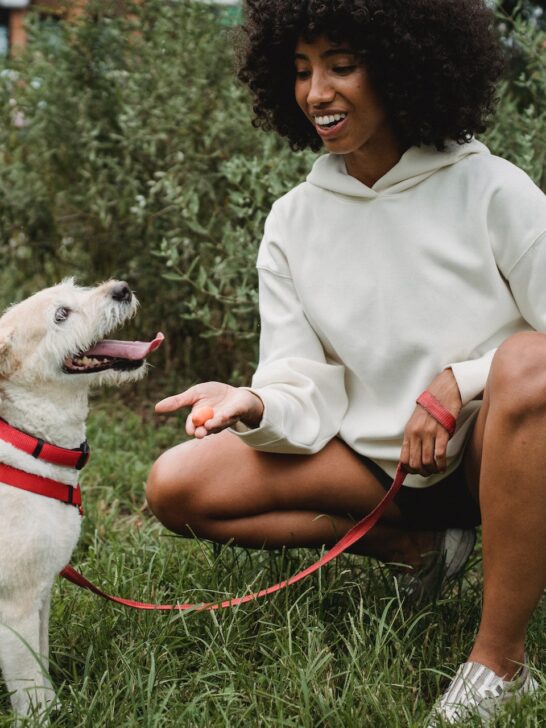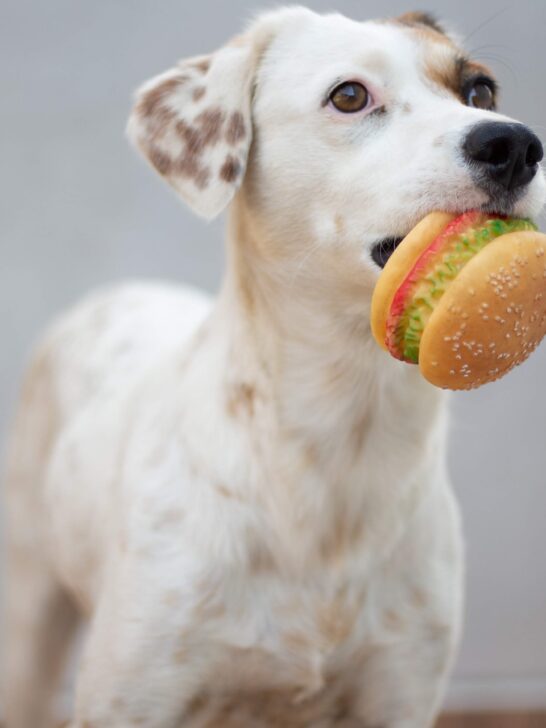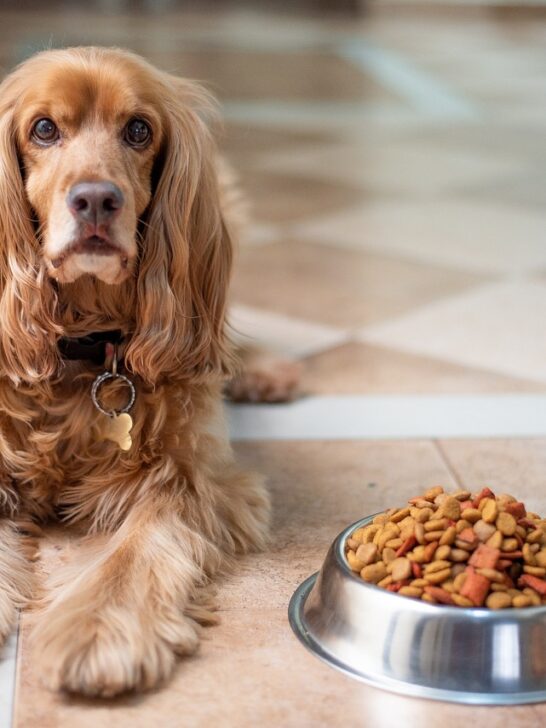Why Is My German Shepherd So Skinny? Reasons You Should Know
You’ve had your German Shepherd for a long time, but you notice something is off. When looking up pictures of other German Shepherds, you see that yours looks much skinnier by comparison.
That’s when you start questioning whether your beloved companion is sick.
The best thing to do in this situation is to bring your dog to the vet. The issue might be something minor, like their diet, or something significant, like an illness or injury.
If your vet tells you that it’s their daily edibles, then there are a multitude of ways you can fix this.
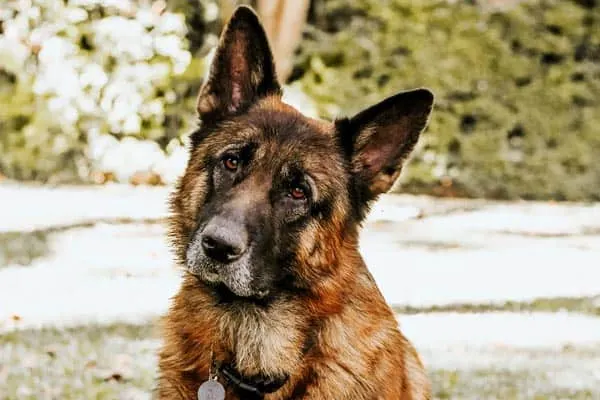
How is My German Shepherd’s Diet Causing It to Be Skinny?
Your dog is either lacking certain nutrients in their daily diet or just not eating enough each day. That isn’t to say that they refuse to eat the food you put out. You might not be putting enough out for them.
This most likely isn’t your fault; German Shepherds tend to have faster metabolisms compared to other dogs.
If you’re used to caring for smaller dogs, puppies, or other canine species, then you probably didn’t know you had to change your companion’s diet.
German Shepherd owners could be feeding their pets based on the wrong age and sex.
Your German Shepherd isn’t Taking in Enough Nutrients
You may go to the grocery store and pick up the first dog food for large canines you see on the shelf. Maybe you buy something that was advertised on TV a lot.
For other dogs, this method might be okay.
For your German Shepherd, however, that cheap food you get might not provide all of the nutrients your companion needs.
Your canine buddy indeed wolfs it down as if their life depends on it most of the time.
However, that dog food might be like human fast food; it may fill you up, but it won’t give you all of the nutrients your body needs.
Your German Shepherd isn’t Eating Enough in General
You might be unknowingly feeding your canine comrade smaller portions. You might be used to feeding them a certain amount because you got them when they were just a juvenile.
It could be easy to overlook just how fast they’re growing.
That’s why it’s crucial to keep track of your German Shepherd’s age regularly. They might not be able to communicate to you that they want seconds or that they’re hungry.
It could also be because they’re a picky eater, so make sure to watch whether they clean their plate.
How Do I Know if My German Shepherd is a Picky Eater?
That is tricky because one way to tell would be if your dog isn’t eating the food. What makes this part complicated is that dogs that leave a full, untouched plate could mean that they’re sick.
It would be a little easier to tell if you take your German Shepherd to the local veterinarian, and they informed you that your companion isn’t sick.
You might have to do some scientific experimentation by filling their bowl with the different options you have multiple times.
The foods your dog barely eats versus the ones they wolf down will help you determine what consumables you should skip buying on your next grocery trip.
You must pay attention to your German Shepherd if they’re picky; the lack of ingesting certain foods might contribute to their malnourishment.
I Changed My German Shepherd’s Diet
The more your companion grows, the more it makes sense for you to adjust their diet. That’s when you transition from puppy chow to adult food.
They clean their plate, and you start to notice that they’re looking skinnier than usual.
There are a lot of factors to take into consideration to ensure your German Shepherd has a balanced diet. Details like these are complicated, which is why you should get a recommended food plan from your vet.
There may be some advice online, but never choose that over what your veterinarian says.
Can Dog Treats, Exercise, and Other Factors Affect My German Shepherd?
Dog treats don’t necessarily make your dog skinnier. They could play a role in helping them gain weight, however.
Exercise means that your German Shepherd is burning more calories, but that doesn’t mean that your dog should neglect such activities just because they’re skinny.
For a lot of owners, their German Shepherds are more than just companions. They might be show dogs or work on a farm.
If your German Shepherd happens to be one of those kinds of canines, then you’ll be going off of a completely different set of guidelines for how much your companion should weigh.
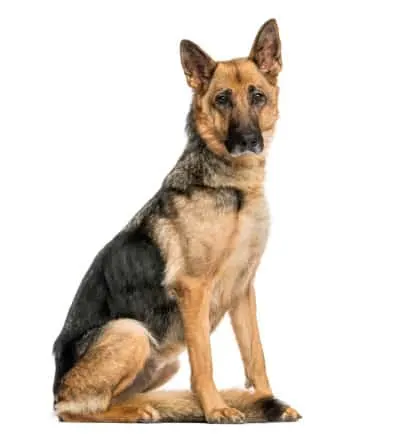
How Do I Fatten Up My German Shepherd?
Putting weight on your pooch is more than merely putting twice the number of food in their bowl. You also have to make sure that they don’t end up being overweight.
It’s essential that your German Shepherd still follows a balanced diet.
The changes can be significant, like buying food that entirely contrasts what they’re used to eating.
It might be a smaller change, like adding some more edibles to their diet. Either way, keep trying multiple strategies until you find the one that works the best.
Add an Extra Meal to Your German Shepherd’s Routine
You should already be feeding your German Shepherd twice a day. If not, then start. Keep track of whether this will help them gain the appropriate amount of weight.
For those who already feed your German Shepherds twice a day, you should upgrade their food plan to three times a day.
Make sure to spread out the meals and that each contains the same amount of consumables.
For example, give your German Shepherd 2.5-3.5 cups of kibble in the morning, evening, and right before they go to sleep.
Give Your German Shepherd More Treats
Provide your companion with more goodies in between meals. If you usually give them one or two treats a day, then give them a couple more. Be sure to spread them out like the meals.
You could also make your treats. If your German Shepherd has given you those puppy eyes whenever they see you eat chicken, then you’ll know what extra food to give them.
Other snacks like apple slices and peanut butter can also be great.
Purchase Dog Food that Contains More Calories
Look at the number of calories your current choice of dog food has. Try to find something with noticeably more protein and fat. Don’t forget to make sure the food is healthy.
Here is a list of the Best Dog Foods For German Shepherds To Gain Weight.
With that in mind, be sure to look out for dog food that has filler ingredients. They can be fine if done right.
If done wrong, however, they could result in your German Shepherd gaining too much weight or getting high blood sugar.
Let Your German Shepherd Eat Whenever They Want
Not all dogs work like clockwork in that their hunger activates at certain times of the day. One day they’ll eat at their mealtime, another day they’ll skip it and eat a little later.
That’s why you should try leaving food out for your German Shepherd at all times.
Make sure only to do this with dry food, as wet food will spoil if left out too long. Monitor how much more or less your German Shepherd is eating their food.
If they aren’t eating as much, then it might be because their excitement at seeing a full plate at set times drives them to eat more.
Give Your Adult German Shepherd Puppy Food
Even with a nutritionally balanced diet, your companion is still underweight. Mix in puppy food with their adult chow. Make sure not to feed them only puppy food.
Talk to your veterinarian about trying this method to ensure that it’s safe for your German Shepherd. If they give you the okay, then start feeding your companion half adult mix and half puppy chow.
It gives you more control in your German Shepherd’s weight gain.
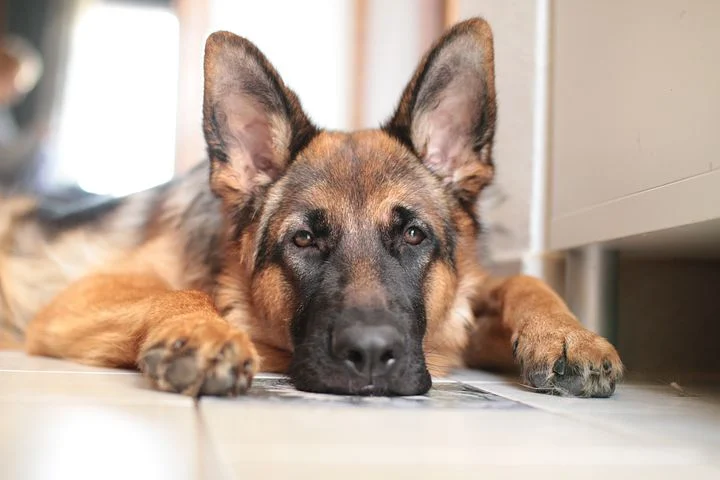
How Do I Keep Track of My German Shepherd’s Weight Gain?
You could use a notepad or try to find an app that’ll help you keep track of your companion’s weight. You can set some goals on how many more pounds you want your German Shepherd to gain.
Remember to ask your veterinarian for that information.
Be sure to write down the diet plans you use for your dog as well as how effective they were. You could even ask your veterinarian how you can keep track of your canine’s progress.
First, however, you’ll need a set of guidelines to follow.
Use a German Shepherd Weight Gain Chart
A German Shepherd’s appropriate weight depends on their age and sex. So it’s crucial to find a chart to use to set goals.
You’ll notice that German Shepherds do get heavier as they get older, and males are usually heavier than females.
There’s no one specific weight but, rather, a weight range. The main factor you have to pay attention to is the percentage of adult weight your companion has depending on their age.
In addition to sex and age are other factors, like the type of German Shepherd you have.
Write Down the Goals You have for Your German Shepherd
Once you’ve determined the right weight range based on your dog’s age and sex, write down what their current weight is. Next, jot down all of the methods you plan on using in a list.
You’ll keep track of the progress made with each strategy.
If you try out one method and it isn’t giving you the results you want, then you can cross it out. Be sure to write down how effective each plan was. Share these results with your veterinarian and see what they say.
Keep Track of Your German Shepherd’s Daily Intake
It could be hard to calculate the exact amount of calories your dog takes in. That’s why you’ll be taking note of how much your dog is eating each day.
You don’t have to keep track of the complicated details, like how much protein they consumed.
The daily intake could include canine food, doggy treats, home-cooked meals, and more. Write down what your German Shepherd’s diet was before you decided to help them gain weight.
It’s good to have that comparison to ensure that the changes you made are effecting your companion.
Don’t Forget to Monitor Time
As you might have noticed with the chart above, a German Shepherd’s weight gain can change by the month.
If your German Shepherd is only months old, then you may not have enough time to transition to a different meal plan before your goals have to change.
Visit your veterinarian regularly for updates on diet methods and results.
You can monitor your German Shepherd’s weight by the week. Depending on how much progress they made can determine whether you want to continue that plan for the rest of the month.
Write down the results of each weekly method you do and decide which one allows them to gain the appropriate amount of weight.
Track Your German Shepherd’s Regular Exercise
Even if your companion is underweight, you still have to give them an exercise routine. Shepherd Sense recommends that because it’ll help your German Shepherd gain muscle.
That’s better than just letting them lay down all day and building up fat.
Start small when exercising your German Shepherd. You can take them on a short walk around the neighborhood. As they gain more weight, gradually increase the amount of exercise you give them.
A lot of the tips mentioned above can apply to all kinds of dogs who need to gain weight.
Like varying dog breeds, however, German Shepherds will need more specific methods since their bodies function a little differently.
Below is a YouTube video that goes over a lot of what we talked about in this article:
You can look to this video for a quick reminder of some of the ways you can help your German Shepherd gain weight.
Ultimately, you should mostly follow your veterinarian’s advice. However, this can be an excellent place to start just in case you can’t see a professional at the moment.
Short Answer:
German Shepherds have fast metabolisms. Add more food to their diet and have them exercise regularly.
Related Reading: German Shepherd Throwing Up: How to Help Your GSD Feel Better Fast

















